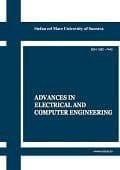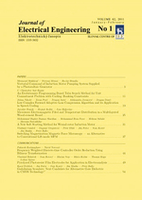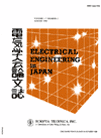
Przeglad Elektrotechniczny
Scope & Guideline
Empowering Innovation in Electrical Engineering
Introduction
Aims and Scopes
- Electrical Engineering:
Research and development in electrical engineering, including power systems, electrical drives, and renewable energy systems. - Control Systems:
Innovative control strategies for various applications, including robotics, motor control, and automation. - Renewable Energy Technologies:
Integration and optimization of renewable energy sources such as solar, wind, and hybrid systems in power generation. - Smart Grids and IoT Applications:
Exploration of smart grid technologies and Internet of Things (IoT) applications for enhancing energy efficiency and management. - Signal Processing and Measurement Techniques:
Techniques for signal processing, measurement systems, and diagnostic tools in electrical engineering. - Electromagnetic Compatibility:
Studies related to electromagnetic interference, shielding, and compatibility in electrical systems. - Material Science in Electrotechnics:
Research on materials used in electrical applications, including superconductors, sensors, and composites. - Machine Learning and AI in Electrical Engineering:
Application of machine learning and artificial intelligence techniques in diagnostics, predictive maintenance, and energy management.
Trending and Emerging
- Renewable Energy Integration:
Research focusing on integrating renewable energy sources, such as solar and wind, into existing power systems, emphasizing sustainability and efficiency. - Smart Grid Technologies:
Exploration of technologies enabling smart grid functionalities, including demand response, distributed generation, and energy storage. - Advanced Control Techniques:
Emerging control strategies, such as sliding mode control and model predictive control, are gaining traction for their applicability in complex systems. - Machine Learning in Electrical Systems:
Increasing incorporation of machine learning and AI for predictive maintenance, fault diagnosis, and performance optimization in electrical systems. - Electric Mobility Solutions:
Research into electric vehicles and charging infrastructure, aligning with global trends towards electrification of transportation. - IoT and Automation:
Growing interest in IoT applications for monitoring and controlling electrical systems, reflecting the shift towards interconnected and automated environments. - Electromagnetic Field Analysis:
Enhanced focus on analyzing electromagnetic fields due to health concerns and the increasing complexity of electronic systems. - Energy Efficiency in Smart Buildings:
Research addressing energy management and efficiency in smart building technologies, reflecting the increasing emphasis on sustainability.
Declining or Waning
- Traditional Electrical Machines:
Research on conventional electrical machines, such as transformers and induction motors, has seen decreased emphasis as newer technologies and methodologies emerge. - Basic Circuit Theories:
The exploration of fundamental circuit theories has waned as the field advances towards more complex systems and applications. - Static Power Quality Issues:
Interest in static power quality issues, while still relevant, has diminished in favor of dynamic and real-time analysis related to smart grids. - Basic Control Theory:
The focus has shifted from basic control theory to more advanced and adaptive control strategies, reflecting the evolution of control applications. - Low-Power Systems:
Research on low-power systems is less prominent as the emphasis on high-efficiency and high-performance systems continues to grow.
Similar Journals

Advances in Electrical and Computer Engineering
Pioneering the Future of Technology and EngineeringAdvances in Electrical and Computer Engineering is a leading open-access journal published by the University of Suceava, Faculty of Electrical Engineering, since 2007, promoting the dissemination of innovative research in the fields of electrical engineering and computer science. With an ISSN of 1582-7445 and an E-ISSN of 1844-7600, the journal serves as a vital resource for researchers, professionals, and students, contributing to the growth of knowledge and technology in these critical areas. The journal holds a respectable Q3 ranking in both Computer Science and Electrical and Electronic Engineering, reflecting its commitment to quality and relevance in high-impact research. Recognized in Scopus, it ranks #154 out of 232 in General Computer Science and #528 out of 797 in Electrical and Electronic Engineering, indicating its solid standing in the academic community. By providing open access to invaluable research findings, Advances in Electrical and Computer Engineering plays a pivotal role in advancing the frontiers of technology and engineering.

University Politehnica of Bucharest Scientific Bulletin Series C-Electrical Engineering and Computer Science
Bridging the Gap Between Research and Real-World ApplicationsThe University Politehnica of Bucharest Scientific Bulletin Series C-Electrical Engineering and Computer Science is an esteemed academic journal dedicated to advancing knowledge in the fields of electrical engineering and computer science. Published by POLYTECHNIC UNIV BUCHAREST, this journal serves as a vital platform for researchers and professionals to share their innovative findings and insights. With an ISSN of 2286-3540 and an E-ISSN of 2286-3559, it has been a beacon of scholarly communication since its inception in 2008. Though currently categorized in Q4 in Electrical and Electronic Engineering, the journal is committed to enhancing its impact within the academic community and industry by fostering research that bridge gaps between theory and practical application. Operating from Romania, the journal emphasizes open access for its readership, ensuring wide dissemination of its content. Researchers, professionals, and students are encouraged to contribute and explore groundbreaking studies, as this journal aims to elevate the discourse and innovation in engineering and computer science.

Electrical Engineering & Electromechanics
Fueling the Future of Electrical and Mechanical DisciplinesElectrical Engineering & Electromechanics, published by the Natl Technical University, Kharkiv Polytechnic Institute, is a leading open access journal that has been disseminating cutting-edge research in the fields of electrical and electronic engineering, energy engineering, and mechanical engineering since its inception in 2006. With ISSN 2074-272X, this journal not only contributes to the advancement of engineering science but also provides a platform for knowledge sharing among researchers, professionals, and students globally. The journal holds a notable position within the academic community, being classified as Q3 in 2023 across multiple categories, highlighting its relevance and influence in the engineering discipline. With Scopus rankings revealing its percentile standing, the journal is positioned to foster innovation and discussion in a rapidly evolving field. The open access model ensures that all published articles are freely available, enhancing the visibility and impact of high-quality research. As it converges towards the years of 2019 to 2024, Electrical Engineering & Electromechanics aims to continually publish groundbreaking studies while encouraging contributions that drive technology and electrical advancements forward.

Jordan Journal of Electrical Engineering
Transforming Research into Real-World ApplicationsJordan Journal of Electrical Engineering, published by TAFILA TECHNICAL UNIVERSITY (TTU) in Jordan, serves as a critical platform for disseminating groundbreaking research in the fields of electrical engineering, energy systems, and related disciplines. With an ISSN of 2409-9600 and an E-ISSN of 2409-9619, the journal is committed to promoting advancements in energy engineering, biomedical applications, control systems, and signal processing among others. Despite its recent establishment in 2023, it has been indexed in multiple categories within Scopus, receiving rankings that reflect its emerging role in the academic community. Researchers and professionals are encouraged to contribute and access cutting-edge articles through open access options, ensuring that knowledge is readily available to all interested parties. As the journal continues to grow, it aims to bridge gaps in knowledge and stimulate dialogue, thereby supporting innovation and practical applications in the engineering sector.

Journal of Electrical Engineering-Elektrotechnicky Casopis
Exploring the Frontiers of Electrical and Electronic Solutions.Journal of Electrical Engineering - Elektrotechnicky Casopis is a distinguished peer-reviewed journal published by Slovak University of Technology, dedicated to advancing the field of Electrical and Electronic Engineering. With an ISSN of 1335-3632, this journal aims to disseminate high-quality research findings, innovative methodologies, and significant technological advancements that contribute to the development of electrical engineering practices. Operating since 2004, it embraces an open-access model to enhance the visibility and accessibility of scholarly articles, thereby fostering knowledge exchange within the global research community. The journal holds a respectable Q3 categorization in the field, ranked 544 out of 797 in Scopus, indicating its growing influence within the discipline. Through rigorous peer-review processes, it provides a platform for researchers, professionals, and students alike to publish their work and stay informed on cutting-edge developments. Located in Bratislava, Slovakia, the journal is an essential resource for anyone involved in the rapidly evolving world of electrical engineering.

Archives of Electrical Engineering
Bridging Academia and Industry in Electrical EngineeringArchives of Electrical Engineering, published by the Polish Academy of Sciences, is an esteemed journal dedicated to advancing the field of electrical and electronic engineering. With an ISSN of 1427-4221 and an e-ISSN of 2300-2506, this open-access journal has been providing an important platform for scholarly communication since its transition to open access in 2010, ensuring wide dissemination and accessibility of research findings globally. The journal covers a diverse range of topics within the electrical engineering domain and is recognized for its contribution to both theoretical and practical advancements in the field, as evidenced by its Q3 ranking in the 2023 category of Electrical and Electronic Engineering. It currently holds a Scopus rank of 471 out of 797, placing it in the 40th percentile. Researchers, professionals, and students are invited to explore cutting-edge research, innovations, and insights published in this pivotal journal that bridges the gap between academic excellence and industry application.

ELECTRICAL ENGINEERING IN JAPAN
Innovating Power Solutions for TomorrowELECTRICAL ENGINEERING IN JAPAN is a leading academic journal published by Wiley, dedicated to advancing the field of electrical and electronic engineering as well as energy engineering and power technology. With an ISSN of 0424-7760 and an E-ISSN of 1520-6416, this journal has been a vital resource since its inception in 1968, appealing to a diverse audience including researchers, professionals, and students interested in the latest innovations and developments within the field. Despite currently holding a Q4 ranking in both Electrical and Electronic Engineering and Energy Engineering and Power Technology categories, the journal remains committed to disseminating significant research that contributes to technological advancements. Although it does not offer Open Access options, articles are peer-reviewed to ensure academic rigor and integrity. With each publication, ELECTRICAL ENGINEERING IN JAPAN continues to play an essential role in fostering a deeper understanding of the engineering landscape, ultimately helping to shape the future of electrical engineering on a global scale.

Electrical Control and Communication Engineering
Exploring the frontiers of electrical control and communication.Electrical Control and Communication Engineering is a premier Open Access journal dedicated to the vibrant fields of electrical engineering, control systems, and communication technologies. Published by SCIENDO, this journal not only aims to disseminate significant research findings since its inception in 2012 but also fosters a collaborative platform for researchers, professionals, and students from around the globe. With its commitment to high standards and rigorous peer review, the journal seeks to advance the collective understanding of innovative technologies and methodologies in electrical control and communication systems. With an ISSN of 2255-9140 and an E-ISSN of 2255-9159, the journal is gaining visibility and impact within the academic community, encouraging open and accessible scholarship to drive progress in this critical sector. Housed in Warsaw, Poland, it is poised to be an invaluable resource for those engaged in cutting-edge research and applications in electrical and communications engineering.

Elektronika Ir Elektrotechnika
Unlocking Potential in Engineering through Open AccessElektronika Ir Elektrotechnika is a premier academic journal dedicated to the field of electrical and electronic engineering, published by Kaunas University of Technology, Lithuania. With an Open Access model since 2004, this journal ensures that cutting-edge research is accessible to a global audience, facilitating the dissemination of knowledge and fostering innovation in the engineering community. The journal is currently categorized in the Q3 quartile for Electrical and Electronic Engineering as of 2023 and holds a Scopus ranking of #473 out of 797, placing it in the 40th percentile. Covering a diverse range of topics from emerging technologies to foundational research, Elektronika Ir Elektrotechnika serves as an invaluable resource for researchers, professionals, and students alike, supporting the advancement of both theoretical and practical aspects in electrical engineering. As we converge towards the years 2008 to 2024, the journal invites submissions that contribute to the evolving landscape of the discipline, aiming to inspire future innovations and collaborations.

Journal of Control Automation and Electrical Systems
Transforming Ideas into Innovations in AutomationThe Journal of Control Automation and Electrical Systems, published by SPRINGER, is a prominent academic journal dedicated to advancing research in the interdisciplinary fields of control systems, automation, and electrical engineering. With an ISSN of 2195-3880 and E-ISSN of 2195-3899, this journal has emerged as a vital platform for disseminating high-quality research, contributing significantly to both theoretical and applied aspects of these interrelated domains. As of 2023, it ranks in the Q2 and Q3 quartiles across multiple categories, including Electrical and Electronic Engineering and Energy Engineering, showcasing its relevance and impact in the field. Although not an open-access journal, it provides rich access options for research works, ensuring that findings reach a wide audience. Researchers, professionals, and students alike can draw valuable insights from its curated articles that explore emerging trends, innovative technologies, and practical applications, thus reinforcing its position as a key contributor to the advancement of control and automation systems.